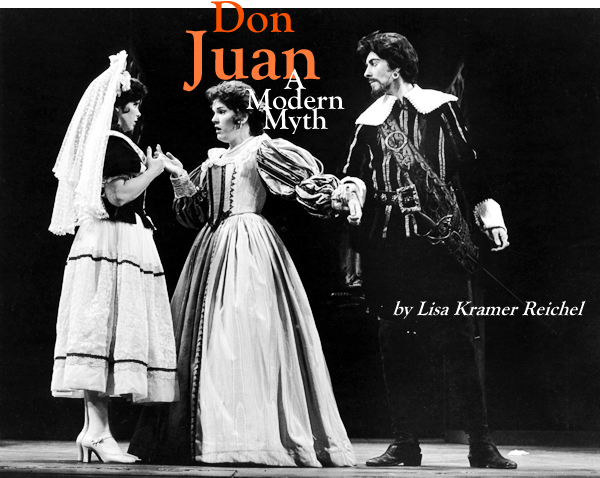
The legendary Don Juan, upon whom the character Don Giovanni is based, is a figure whose exploits have provided inspiration for authors and artists for more than three centuries.
The story of this free-thinking nobleman, who seduced women recklessly and dared to insult the dead before finally being condemned to hell, seems to find its origin in Spain. His archetype is believed to be a medieval man named Don Juan Tenorio who, after seducing the daughter of the commandant of Ulloa, killed the commandant and then was killed by avengers who claimed that he was carried off to hell by the statue of the commandant.
The story of Don Juan received its first full dramatic setting on stage in the 1630 moralistic play El Burlador de Sevilla y convidado de piedra (The Prankster of Seville and His Stone Guest) written by a Spanish monk who published under the pseudonym Tirso de Molina (1571-1641). El Burlador was brought to Italy, probably via strolling actors, and by 1652 was translated into Italian.
An Italian troupe brought the story to France where it also found success. In 1665, the great French dramatist Molière wrote his own version of the Don Juan story in a play Don Juan, ou Le Festin de Pierre (Don Juan, or the Feast of Stone). The Don Juan story was soon rewritten in many languages. It even found its way into the hands of puppeteers.
Musical versions soon followed. The first seems to have been a Parisian comic opera, also with the title Le Festin de Pierre, composed in 1713 by Le Tellier. A Don Juan ballet by German composer Christoph W. Gluck was presented in Vienna in 1761.
Vincenzo Righini composed a full-length Don Giovanni opera in 1777. Ten years
later, in 1787, another Don Giovanni opera appeared with libretto by Giovanni Berttati and music by Giuseppe Gazzanniga. It was upon this version that librettist Lorenzo Da Ponte based the story and Mozart composed his masterful Don Giovanni.Although Mozart's Don Juan story is the greatest and most well known, many versions have followed including operas, musical numbers, and literary works. Some of the world's foremost poets and writers found inspiration in the Don Juan story including Alexander Dumas père in France, George Gordon Lord Byron and George Bernard Shaw in England, and Aleksandr Pushkin in Russia.
Why has the Don Juan story held such appeal? Perhaps the answer can be found in the manner in which the character constantly challenges conventional morality. During the Middle Ages, it was believed that all knowledge and power were not under human control but came from the Church. With the breakdown of the universal Church in the late Middle Ages, man began to question everything including belief in heaven and hell.
Don Juan delights in these changing beliefs and unabashedly breaks all the rules. He indulges his every desire without inhibition, restraint, guilt, or concern for the impact of his actions. While we condemn him for the murder of the commandant, we are at the same time fascinated by his flamboyant escapades and the power he seems to hold.
Don Juan can be likened to a more contemporary mythic figure — James Bond, the famous Agent 007. He is the very intriguing international spy who has a limitless supply of charm and knowledge, not to mention all of the right tools and weapons, to get him out of any and every perilous predicament. His adventures usually involve a great many colorful characters and fantastic situations — like the statue coming to life in the Don Juan story. Although Bond kills and seduces in his pursuit of justice, he always saves the day (and gets the girl!) — and, in light of his victory, his sins become irrelevant. Because Agent 007 works to help virtuous countries (like ours!), he is not condemned to a gloomy demise.
We owe a legacy of creative works to the Don Juan myth which continues to remain enticing and popular even today. For that, and, of course, Mozart's beautiful music, Don Giovanni continues to remain an audience favorite.
Above photo: Don Giovanni, Cleveland Opera, 1983